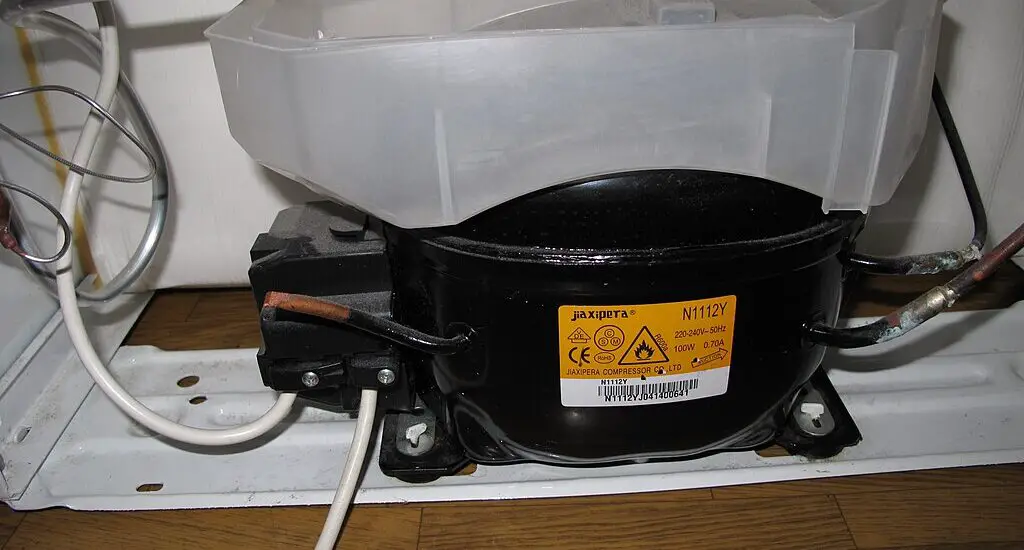Is your refrigerator compressor hot and not cooling? This guide will walk you through every necessary step to diagnose and resolve this problem.

Initial ‘Refrigerator Compressor Hot and Not Cooling’ Troubleshooting Steps
Before you can resolve the issue, you need to get a sense of what’s causing it. Here are some preliminary steps to help you diagnose the problem:
Unplug the Refrigerator: Never try to examine or fix your refrigerator while it is plugged in. Electrical appliances can be dangerous if not handled properly. Turning off the power is the first safety measure you should take.
Check for Obstructions: Take a look around the compressor and condenser coils, usually located at the back or bottom of the fridge. Ensure there are no physical obstructions like cardboard boxes, cloth, or any other items that could block airflow.
Inspect Wiring: With the refrigerator unplugged, check for any loose or frayed wires around the compressor. If you notice discolored wires or smell burnt plastic, this could indicate an electrical issue.
Possible Solutions for a Hot and Non-Cooling Compressor
If your initial investigation doesn’t reveal an immediate solution, here are some remedial steps you can take:
Reposition Food
Take a few minutes to reorganize the food items in your fridge and freezer. Make sure that none of the vents are blocked, allowing for better airflow and, consequently, better cooling. It’s like arranging people in a room so that everyone can see the TV; proper positioning ensures everyone is happy.
Clean the Coils
Use a soft brush or a vacuum cleaner with a brush attachment to clean the condenser coils. This will improve their efficiency in dissipating heat, and taking the load off the compressor. It’s like cleaning the filter of your AC; you’ll notice an immediate improvement in performance.
Check Electrical Connections
If you have some knowledge of electrical tasks, tighten any loose electrical connections, or replace visibly damaged wires. If you’re not confident with electrical work, this is the time to call a professional. It’s like fixing a flat tire; if you know how to do it, great. If not, don’t hesitate to seek professional help.
When to Call a Professional
If you’ve tried all the above solutions and your compressor is still hot and not cooling, don’t hesitate to call a certified technician. Continuing to use a malfunctioning fridge can result in more serious problems like complete system failure or even potential safety hazards.
Check out these other articles…
Refrigerator Compressor Explanation: Comprehensive 411 Guide
Refrigerator Compressor Error: Easy Fixes
Refrigerator Compressor Frozen: 4 Easy Steps to Fix It
Refrigerator Compressor Getting Louder: Easy Solution Guide
Refrigerator Compressor Gas Pressure: Easy 411 Guide
Common Causes of Refrigerator Compressor Hot and Not Cooling
Understanding the root causes of the problem can help you prevent this issue from reoccurring. The compressor may get hot for several reasons:
Overloading: Filling your refrigerator to the brim may seem like an efficient use of space, but it actually hinders the internal airflow. A congested fridge forces the compressor to work harder, increasing its temperature. In simple terms, an overloaded fridge makes your compressor do extra work, making it hot.
Blocked Coils: Condenser coils dispel the heat from inside the fridge to the outside environment. When these coils are clogged with dust, dirt, or pet hair, they can’t efficiently dissipate heat. As a result, the compressor works harder and heats up. Imagine trying to breathe through a cloth; it’s harder, right? That’s what your compressor feels when the coils are blocked.
Electrical Issues: Loose wiring, corroded connections, or faulty capacitors can affect the compressor’s performance. Poor electrical connections can force the compressor to run ineffectively, which may result in overheating. Think of this like running a machine with a subpar battery; it won’t work efficiently and might even harm the machine.